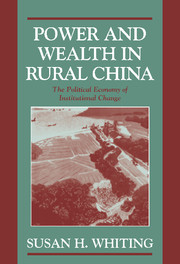Book contents
- Frontmatter
- Contents
- List of Maps, Figures, and Tables
- Preface
- 1 Explaining Institutional Change
- 2 The Maoist Legacy in Rural Industry
- 3 Incentive Structures and Local Cadre Behavior
- 4 Incentives, Constraints, and the Evolution of Property Rights
- 5 Stasis and Change in Extractive Institutions
- 6 Credit Allocation and Collective Organizational Structures
- 7 The Political Economy of Institutional Change
- Appendix
- Bibliography
- Index
2 - The Maoist Legacy in Rural Industry
Published online by Cambridge University Press: 30 September 2009
- Frontmatter
- Contents
- List of Maps, Figures, and Tables
- Preface
- 1 Explaining Institutional Change
- 2 The Maoist Legacy in Rural Industry
- 3 Incentive Structures and Local Cadre Behavior
- 4 Incentives, Constraints, and the Evolution of Property Rights
- 5 Stasis and Change in Extractive Institutions
- 6 Credit Allocation and Collective Organizational Structures
- 7 The Political Economy of Institutional Change
- Appendix
- Bibliography
- Index
Summary
RURAL industry has expanded dramatically since 1978; indeed, Deng Xiaoping described it as one of the great, unanticipated successes of the post-Mao economic reforms (Ma, Wang, and Liu 1994:2). However, it would be historically inaccurate to characterize rural industrial growth simply as a product of reform. While key changes in the institutional environment of local officials at the outset of the reform period contributed in important ways to the takeoff of rural industry, its development in the 1980s and 1990s also had deeper historical roots. The legacy of rural industrial development during the Maoist period has had profound implications for the subsequent development of rural industry during the reform period.
Rural industrialization was in part a legacy of the Great Leap Forward from 1958 to 1961, as epitomized by the slogans of “self-reliance” and “walking on two legs.” However, contrary to the commonly accepted official rhetoric of “self-reliance,” the areas in which rural industries were most successful under Mao were, in many ways, the least self-reliant. Indeed, rural industry in Wuxi and Songjiang Counties received signifi-cantly more state support than is commonly understood and certainly more than is implied by the slogan of “self-reliance.” By contrast, rural industry in Yueqing County received relatively little state support and was arguably much closer to the Maoist ideal of self-reliance. Ironically, however, it was Yueqing that was most frequently and vehemently attacked during the Maoist period for its “capitalist excesses.”
- Type
- Chapter
- Information
- Power and Wealth in Rural ChinaThe Political Economy of Institutional Change, pp. 40 - 71Publisher: Cambridge University PressPrint publication year: 2000



